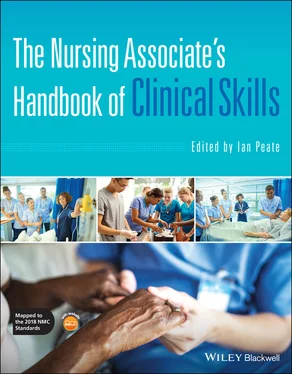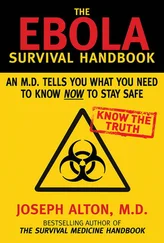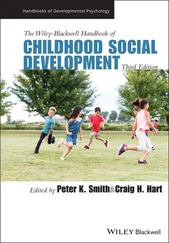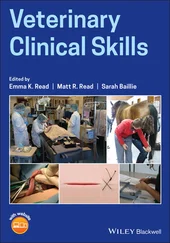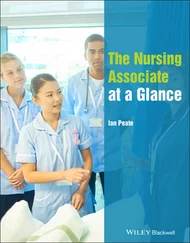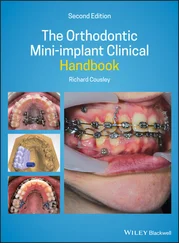The Nursing Associate's Handbook of Clinical Skills
Здесь есть возможность читать онлайн «The Nursing Associate's Handbook of Clinical Skills» — ознакомительный отрывок электронной книги совершенно бесплатно, а после прочтения отрывка купить полную версию. В некоторых случаях можно слушать аудио, скачать через торрент в формате fb2 и присутствует краткое содержание. Жанр: unrecognised, на английском языке. Описание произведения, (предисловие) а так же отзывы посетителей доступны на портале библиотеки ЛибКат.
- Название:The Nursing Associate's Handbook of Clinical Skills
- Автор:
- Жанр:
- Год:неизвестен
- ISBN:нет данных
- Рейтинг книги:4 / 5. Голосов: 1
-
Избранное:Добавить в избранное
- Отзывы:
-
Ваша оценка:
- 80
- 1
- 2
- 3
- 4
- 5
The Nursing Associate's Handbook of Clinical Skills: краткое содержание, описание и аннотация
Предлагаем к чтению аннотацию, описание, краткое содержание или предисловие (зависит от того, что написал сам автор книги «The Nursing Associate's Handbook of Clinical Skills»). Если вы не нашли необходимую информацию о книге — напишите в комментариях, мы постараемся отыскать её.
The Nursing Associate’s Handbook of Clinical Skills
The Nursing Associate’s Handbook of Clinical Skills
The Nursing Associate's Handbook of Clinical Skills — читать онлайн ознакомительный отрывок
Ниже представлен текст книги, разбитый по страницам. Система сохранения места последней прочитанной страницы, позволяет с удобством читать онлайн бесплатно книгу «The Nursing Associate's Handbook of Clinical Skills», без необходимости каждый раз заново искать на чём Вы остановились. Поставьте закладку, и сможете в любой момент перейти на страницу, на которой закончили чтение.
Интервал:
Закладка:
In written records, there are no spell checkers that can be used. Few nursing associates or registered nurses would be able to ever say that they had never made a spelling mistake or typing error within a record; how these are managed and minimised can improve the accuracy and clarity of the record. In some instances where perhaps a drug name is being recorded or a diagnosis is being written, it is essential that the word is spelt correctly. In these instances, it is a good practice to use a good nursing or medical dictionary. Many of these dictionaries are available online and are easily accessible through apps on mobile devices. The earlier guidance regarding making corrections is important so that the reader can see that the misspelled word has been changed and that the crossed‐out word was nothing more than a correction and not an attempt to alter or falsify a record. While discussing clarity of a record, it has to be considered that a record should be timed and not just dated to demonstrate that care has been provided and there is sequential logic to the entry.
Supporting Evidence
The Royal College of Nursing (2010) has produced some good suggestions in a tool kit, for nursing associates and other healthcare professionals with dyslexia, dyspraxia and dyscalculia.
Dated and Timed
The NMC requires that all records be dated and timed, and all records must be made in a timely fashion as soon as the event as is reasonably possible, and The Code emphasises this. All computer records will be automatically dated and time‐stamped when the record is made; however, the computer will not recognise that a record may relate to an event that occurred two hours ago and the time attributed to the record will be the current time. Therefore, it is imperative that all nursing associates attribute the correct time. The same can occur during the night where a record is made after midnight relating to an episode of care that occurred before midnight. In this instance, the date as well as the time needs to be correctly identified. This applies equally in a written record, but the written record will make no automatic assumption or entry in relation to the date and time, and the nursing associate must make this a clear part of any record that they make. The timing of a record demonstrates the sequence of care events. Ideally, records are made at the time of the event and, therefore, will be in the correct chronological order; however, when this is not possible, it is a good practice to indicate the time that the record relates to so that anyone examining the records historically (in retrospect) can establish a time line of events. The format of the time must be considered; the 24‐hour clock is much harder to confuse in a record that uses the 12‐hour clock. For example, in the 12‐hour clock, 1 o’clock appears twice, whereas in the 24‐hour clock, these are clearly written as 01:00 h and 13:00 h. Recording 1 a.m. and 1 p.m. can be confusing, and the differentiation in the 24‐hour clock is very clear. The final NMC element of The Code with regards to record‐keeping is the issue of speculation.
Speculation
The subject of speculation in records made by nursing associates is an important requirement when considering clarity. Not making any speculation in record‐keeping requires accuracy, and there must be no guessing, for example, recording that a person with a high temperature may be septic when the diagnosis has not been confirmed by a senior nurse or doctor demonstrates speculation. All records must be factual in nature.
Touch Point
How could these five records be documented so that they are not speculative?
| Mrs Jones has a high temperature | |
| Mr Thomas has passed a large amount of urine this afternoon | |
| Mrs Kowalczyk’s blood glucose is high, and she will probably have a stroke | |
| Mrs Evans has diarrhoea; she must have eaten something bad | |
| I think Mr Morgan is in pain |
Speculation could also be interpreted as an attempt to gamble. Putting this into the context of record‐keeping, it would mean drawing conclusions with only part of the evidence; here, the nursing associate speculated and fails to consider facts. Gambling could mean that there is a 50% chance that the conclusion drawn is correct. This means that there is also a 50% chance that the conclusion drawn is incorrect; therefore, all records must be maintained factually and not speculatively. Similarly, speculation could mean ‘to assume’. Just because a person appears a certain way, an assumption must not be drawn. Again, records must deal in facts only. The next requirement of the NMC Code that relates directly to record‐keeping discusses secure storage.
Safe Storage
Section 10.5 of The Code states that all nursing associates must take all steps to make sure that records are kept securely. Whether a record is made and stored electronically or by hand, the requirement and expectation regarding storage is the same. Firstly, computerised records will generally be stored securely, and the backup of such documents will be automated by an IT department so that the final security and integrity of a record is maintained on the whole without the nursing associate having to be concerned with safe storage of the record. Safe storage also concerns access to records, and the nursing associate is accountable and responsible for any actions or omissions. With regards to safe storage, many computers have a lock screen which automatically engages after a set period of time that the computer is idle. This set time varies from computer to computer but could be as little as a couple of minutes to 15 minutes. In this time, anyone could access the computer if the lock screen has not been manually or automatically engaged and affect the safe storage and integrity of records. The process of manually engaging this lock screen is usually quite straightforward but will mean that the nursing associate will then need to log in to the device again, ensuring that the security of the records has been maintained by limiting access.
Orange Flag
 A nursing associate in a very busy outpatient clinic had forgotten to manually log off from the workstation that he was working at. The next user (the ward clerk) sits down to access the computer and notices that the records that the nursing associate was using belong to his ex‐wife; he reads the records and discovers that his ex‐wife had, on more than three occasions, attempted suicide.
A nursing associate in a very busy outpatient clinic had forgotten to manually log off from the workstation that he was working at. The next user (the ward clerk) sits down to access the computer and notices that the records that the nursing associate was using belong to his ex‐wife; he reads the records and discovers that his ex‐wife had, on more than three occasions, attempted suicide.
The content of the record was inflammatory and accusatory; the ward clerk was clearly upset by what she was reading.
The negligent action caused by the nursing associate in failing to log off from the workstation caused psychological harm to the ward clerk who was clearly distressed by what she had read. What action should be taken next?
When considering safe storage of manually made records, it is the nursing associate who is accountable for ensuring that the record that they are accessing and making an entry in is returned to its safely stored position that it was in before it was used. Some records will be stored at the patients’ bedside or in their own home, but other records will be stored centrally in the clinical area. It is crucial that the nursing associate considers the record that is being accessed and stores it appropriately thinking again about how limited the access to the record needs to be.
Take Note
Интервал:
Закладка:
Похожие книги на «The Nursing Associate's Handbook of Clinical Skills»
Представляем Вашему вниманию похожие книги на «The Nursing Associate's Handbook of Clinical Skills» списком для выбора. Мы отобрали схожую по названию и смыслу литературу в надежде предоставить читателям больше вариантов отыскать новые, интересные, ещё непрочитанные произведения.
Обсуждение, отзывы о книге «The Nursing Associate's Handbook of Clinical Skills» и просто собственные мнения читателей. Оставьте ваши комментарии, напишите, что Вы думаете о произведении, его смысле или главных героях. Укажите что конкретно понравилось, а что нет, и почему Вы так считаете.
